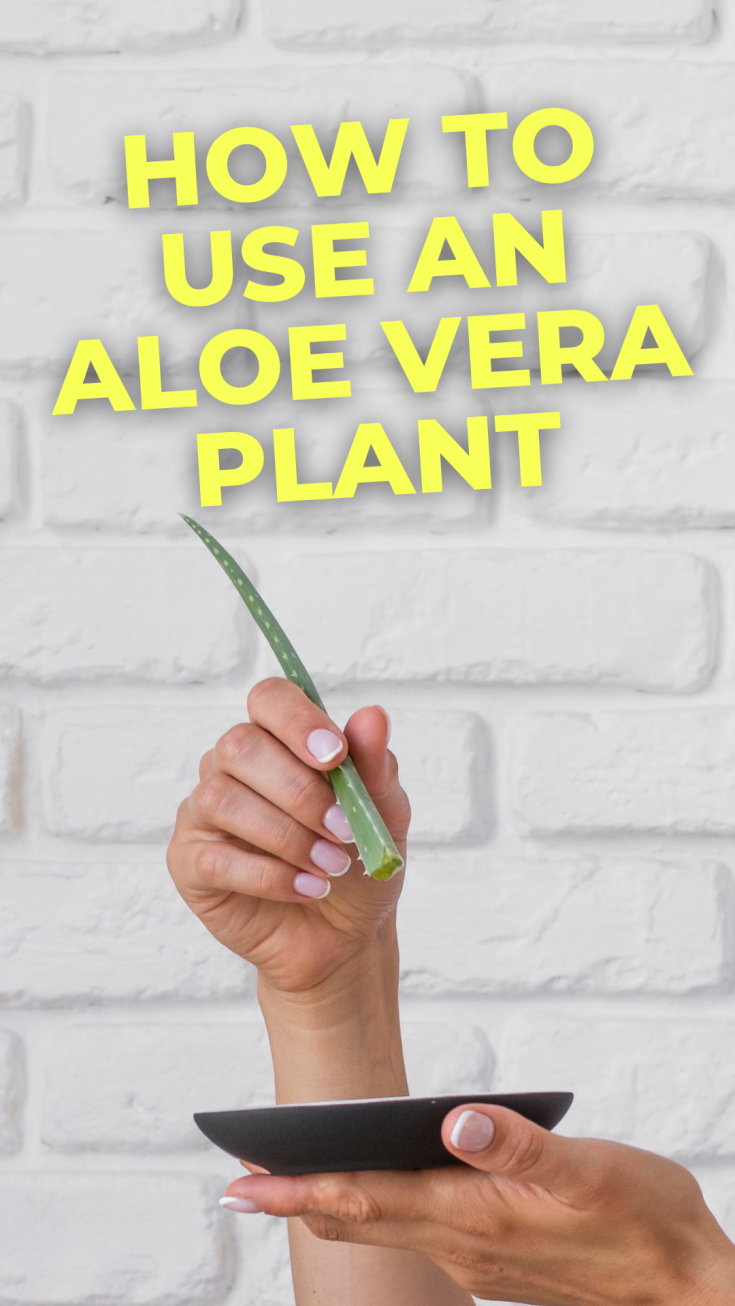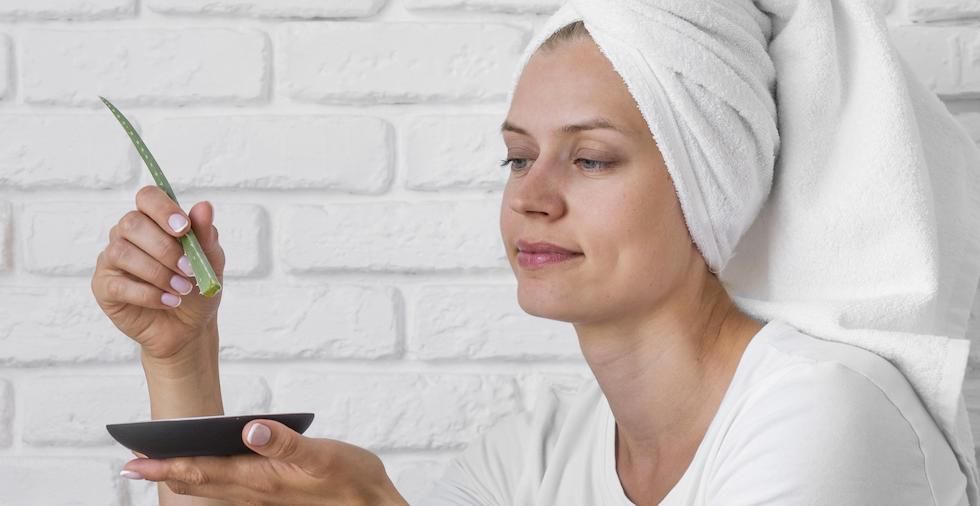Are you looking for a fast way to upgrade your health? Aloe vera may be the answer. This spiky desert plant is wildly popular within the realms of holistic wellness. You can reap the rewards when using it within your health regime, but where should you begin? If you have no clue how to use aloe vera to enhance your health, you've come to the right place. This short guide will look at everything you need to know.
What is an aloe vera plant?
Native to Oman and now growing in continents all around the globe, aloe vera is a vibrant, green succulent. The leaves of this plant are arranged in a rosette with small spikes on each side. Although it makes a popular, low-maintenance houseplant, you should be careful when you are near one of these plants, or you might get a nasty shock when you touch it. The flowers of this plant are yellow and shaped like small tubes. However, it is the leaves that are most recognisable with this plant.
Cut the leaves open, and you'll find a clear gel inside them. The liquid has a myriad of health benefits and, for that reason, has been used in cosmetics, medicine, and various commercial products. So, if you are lucky enough to get your hands on one of these plants, there are plenty of ways you can use it to enhance your wellness.
The National Institutes of Health (NIH) reports that the aloe vera plant dates back 6,000 years. During that time, people worldwide have used the plant in their health and medicine. Some common uses for this plant (or the gel you will find inside the leaves) include hair growth, treating wounds, clearing up cold sores, and dealing with sunburn. When you learn about the benefits of the plant, you can start using it yourself.
How to use an aloe vera plant: 4 approaches to try
Now that you know what the aloe vera plant is, it's time to consider how you can use it. The good news is that there are plenty of options. Since the plant has been around for millennia, you can use many tried and tested approaches. When you look at many of the mainstream cosmetic products you use, you may see them listed as an ingredient. A good reason is that the plant can benefit every area of your life.
Wondering how you can get started? While there are countless ways aloe vera can enhance your health, we're about to focus on four options you can try. So whether you want stronger hair or to clear up acne, there's an approach that you can use. With that in mind, let's look at the easiest ways to use the plant for your health.
1. Grow healthy and long hair
Do you want long, luscious locks? Of course, you do. Many of us would love to have long, shiny, Rapunzel-esque hair. However, the truth is that we often find it hard to get the look we desire.
It's a classic problem. No matter how much you look after your hair, it does not grow. So if you feel your hair is perpetually short, you're not alone. According to the Trichological Society, the average hair growth is around one centimetre per month. So your hair doesn't grow all that fast naturally.
Wondering how to use aloe vera for hair? We've got the answer. While there is only anecdotal evidence that aloe vera can boost your hair growth, there is some scientific research into the power of this plant. Research suggests that using it as a treatment on your head could result in less itchiness and dryness if you have a skin disease. That's great news if you're trying to get rid of dandruff.
It doesn't end there. Another study on the benefits of aloe vera for hair suggests that it stimulates oxygen, circulation, and nutrients in your hair follicles. All of the above could help your hair grow longer, so it's worth a try if you're trying to grow out a fringe or maybe even make facial hair grow faster. Look for aloe vera-rich hair products to get started and see if natural hair care is for you.
2. Supplement your skincare
Keeping your skin clear and beautiful is always the aim of the game. Aloe vera may be effective in hydrating and moisturising your skin, which is particularly good for your winter skincare regime, as well as your everyday skincare routine. There are a few options to try:
● Face wash
To use aloe vera as a face wash, you need to get some of the gel between your fingers. Next, massage the gel into your face and then rinse. You should avoid your eyes and any sensitive areas of your face when doing this.
● Moisturising face mask
Is your skin looking a tad dry? Don't panic. You can use the gel from aloe vera as a hydrating face mask. Rub the gel all over your face and leave it for around 10 minutes. When you've done that, you can rinse it off thoroughly. Avoid your eyes again. Anyone for a relaxing, DIY facial?
● Acne or spot treatment
Do you break out regularly? Dealing with spots or even acne can be a real struggle. Luckily, you can make a spot treatment using aloe vera. Mix some gel with lemon juice and apply it to the affected area. Leave for a couple of minutes, and then rinse. If you are concerned about your skin health, visit a dermatologist or GP.
3. Lower your blood sugar
Did you know that you could drink aloe vera juice? While that may sound odd, the potential health benefits of this drink are miraculous. One of the more recent studies into its power suggests that it helps lower blood sugar in people with diabetes. If you are worried about this aspect of your health, you may want to include juice in your everyday diet.
However — as a word of caution — if you have diabetes and already take some blood sugar-lowering medication, you may want to hold your horses. Supplementing this medicine with some aloe vera juice may be dangerous. For that reason, you should speak to your doctor about this issue. On the other hand, if you are not taking any medication right now, you may find that drinking the juice is a natural (and easy!) way to get those glucose levels down.
4. Relieve your heartburn
Suffering from heartburn can be excruciating. While making dietary changes is perhaps the quickest way to get rid of heartburn, there are other options. For example, you may not have considered consuming aloe vera syrup when you eat your meals. It may sound weird, but this quick hack could work.
According to a scientific review of aloe vera syrup, this approach can lower GERD symptoms. However, before using it as holistic medicine, you should speak to your GP. The famous plant is low in toxicity, meaning you can use it without any issues. However, it is always worth getting a doctor's opinion before you start supplementing your diet.
As we have covered, there are many ways that you can use aloe vera in your everyday health and wellness. Now that you've got the inside scoop, why not try some of these approaches yourself? You may be surprised by the fantastic results you reap here.
Q&A
Have we missed something about aloe vera? If you have a burning question, never fear. Check out these frequently asked questions for the answers that you need.
Is aloe vera edible?
The simple answer is yes. You can eat aloe vera gel and drink aloe vera juice. However, you should ensure the gel is scooped out well and prepare it in advance. You may want to get aloe vera-rich products rather than preparing them yourself. The outer green skin of the plant can be eaten, but it has a bitter taste when raw.
Does aloe vera juice taste good?
The taste of aloe vera juice can be pretty bitter at first. If you have never had this drink before, you might be surprised when you try it. Consumers also report a plant-like flavour when using aloe vera juice in their diet plan.
Can you leave aloe on my face overnight?
Yes! Aloe vera gel can be used as a hydrating face mask. If your skin is dehydrated, you may want to leave it on overnight. You can rub the gel onto your skin, sleep in it, and then rinse well and cleanse when you wake up.
Have you tried using aloe vera? Let us know what you love about it in the comments below.


My son gave me a plant for mothers day several years ago. I keep it on my kitchen window sill and use it mainly for cuts and burns. The plant has had several "babies" that I have repotted and given away.
That's wonderful! It sounds like you have a special plant that brings beauty to your kitchen window sill and serves a practical purpose.
Although Aloe Vera is used for many things by many people i thought i had better mention i get a very bad reaction to Aloe Vera. I know a few others that have the same problem ,so please be careful !
Thank you for sharing that information. It's important to note that while Aloe Vera is generally well-tolerated by most people, there are rare cases of individuals experiencing allergic reactions or sensitivity to it. As with any substance, it's crucial to be aware of your body's response and discontinue use if you have any adverse effects. If you have known allergies or sensitivities, it's always a good idea to consult a healthcare professional before using Aloe Vera or any other new product.
Thank you this was really interesting to see different uses. We have lots of aloe plants dotted around the house for cuts and rashes etc. I have tried consuming the gel inside before to be healthy, but I heard the green leaf part was a laxative?
The gel inside the aloe vera plant is generally considered safe for consumption and has various health benefits. However, the outer green leaf part, known as the latex, can have a laxative effect due to its anthraquinone content. It's important to avoid consuming the latex portion directly, as it can cause gastrointestinal discomfort and potentially have a laxative effect.